My wife and I are enjoying our usual summer vacation in Utah. We spent the first several days down south, hiking Capitol Reef and Grand Staircase, and are now in Brighton trekking the alpine clime.
Notable for this trip, though, is the GPS unit we've added to the family, and with it we've discovered geocaching. What is geocaching, you ask? From Wikipedia:
Geocaching is an outdoor sport that involves the use of a Global Positioning System (“GPS”) receiver to find a “cache” placed anywhere in the world. A typical cache is a small, waterproof container full of “treasures”. Geocaching is a unique take on a traditional Easter-egg hunt in that it uses two recent technologies, the GPS and the Internet.One participant will place the cache and note its coordinates. These coordinates, along with other details of the location are posted online. Other players obtain the coordinates from the Internet and, using handheld GPS receivers, seek out the caches, hoping to record their exploits in a logbook contained therein. Geocachers are free to take objects from the cache, in exchange for leaving something in return, so there's always a “treasure” for the next person to find.
We've found three caches so far:
We've had a great time, and plan to hike caches the rest of the trip. If you want to learn more about geocaching, I'd suggest a visit to the geocache center of the universe: Geocaching.com.
My wife and I are vacationing in Utah for the next week (expect photoblog updates in short order). As I connected to the web to catch up on the world this morning, I learned that Michele and I have received press credentials (for the hall, no less) for the Democratic National Convention in Boston later this month.
I'm going to try and go, if only for a day or two, to blog a bit, rub elbows with press and politicos, and see history happen.
I posted this at my other gig last weekend, and thought it would be of interest here as well.
As the argument over Iraq continues to develop, it's clear to me that there’s still confusion about the Pentagon's Office of Special Plans (the OSP), especially since some are claiming the OSP is now a “never existed” organization within the Pentagon (people can’t find any evidence of it, etc.).
That may or may not be, but there’s plenty of information of the OSP in the public domain, so here’s a primer on the topic:
Throughout the summer, the NESA spaces in one long office on the fourth floor, between the 7th and 8th corridors of D Ring, became more and more crowded. With war talk and planning about Iraq, all kinds of new people were brought in. A politically savvy civilian-clothes-wearing lieutenant colonel named Bill Bruner served as the Iraq desk officer, and he had apparently joined NESA about the time Bill Luti did. I discovered that Bruner, like Luti, had served as a military aide to Speaker Gingrich. Gingrich himself was now conveniently an active member of Bush's Defense Policy Board, which had space immediately below ours on the third floor.I asked why Bruner wore civilian attire, and was told by others, “He's Chalabi's handler.” Chalabi, of course, was Ahmad Chalabi, the president of the Iraqi National Congress, who was the favored exile of the neoconservatives and the source of much of their “intelligence.” Bruner himself said he had to attend a lot of meetings downtown in hotels and that explained his suits. Soon, in July, he was joined by another Air Force pilot, a colonel with no discernible political connections, Kevin Jones. I thought of it as a military-civilian partnership, although both were commissioned officers.
Among the other people arriving over the summer of 2002 was Michael Makovsky, a recent MIT graduate who had written his dissertation on Winston Churchill and was going to work on “Iraqi oil issues.” He was David Makovsky's younger brother. David was at the time a senior fellow at the Washington Institute and had formerly been an editor of the Jerusalem Post, a pro-Likud newspaper. Mike was quiet and seemed a bit uncomfortable sharing space with us. He soon disappeared into some other part of the operation and I rarely saw him after that.
In late summer, new space was found upstairs on the fifth floor, and the “expanded Iraq desk,” now dubbed the “Office of Special Plans,” began moving there. And OSP kept expanding.
Notably, Michael Rubin takes Kwiatkowski to task at NRO here. In it he notes:
Kwiatkowski did serve in the Pentagon prior to the war, as did I, as did approximately 23,000 others. But, Kwiatkowski was not involved in Iraq policy. Her reminiscences fall more into the realm of fiction than fact. I worked in the Office of Special Plans (OSP), charged with some aspects of the Iraq portfolio. My job was that of any desk officer: Writing talking points for my superiors, analyzing reports, burying myself in details, and drafting replies to frequent letters from Congressmen John Dingell and Dennis Kucinich. I was a participant or a fly-on-the-wall at many postwar planning meetings and accompanying video teleconferences. One person I never met was Kwiatkowski. This should not be a surprising. Kwiatkowski was an Africa specialist who was the point woman for issues relating to Morocco. Just as I never attended meetings relating to Western Sahara, Kwiatkowski was not involved in Iraq policy sessions.Rather than an inside scoop, Kwiatkowski provided an ideological screed. By her own admission, she started writing Internet columns while still a Pentagon desk officer. But, she did not know many of the people about whom she wrote. The Office of Special Plans consisted of a small number of active duty military officers, reservists, and civilians; both Democrats and Republicans. Kwiatkowski got ranks and services wrong. In rank-conscience corridors of the Pentagon and among military officers, such things do not happen.
Upon her retirement, Kwiatkowski took her story to Jeff Steinberg, editor of the Executive Intelligence Review, the journal of Lyndon LaRouche's movement. Pat Lang, former chief Middle East analyst at the Defense Intelligence Agency, circulated Kwiatkowski's deposition to Steinberg in a September 16, 2003, e-mail in which he carbon-copied, rather than blind carbon-copied his distribution list. Among the recipients were prominent journalists and producers, scions of the alternative press, and a smattering of current and former intelligence analysts who often serve as sources in news analyses and articles.
First of all, the Office of Special Plans that you referred to has nothing really whatsoever to do with intelligence it is one of the regional offices in the policy organization. We have regional offices for Latin America and Africa and Asia. We had - it is the Office of Northern Gulf Affairs. It was created in the fall of 2002 when we had to beef up our staff to handle all of the extra Iraq related work. We needed to increase it by something like 18 people. So we created a new office, and since there was an enormous amount of attention on the Pentagon, on what we were doing and are we planning for war and the creation of a new office that would have been called the Iraq office would have probably in and of itself created headlines. We chose the kind of name that the government gives to offices throughout the government that’s kind of nondescript - you know, “special plans,” long-range plans” - that kind of thing and it's been grist for the conspiracy mongers ever since. But you referred to some intelligence unit, as many press reports did, confuse it with the special plans office. The so-called intelligence unit that was much discussed - it was two people, it was two people who did a project for about - it as not a unit, it was not an office. It was two people. And they did a project for about three months, and then another two people did a follow-on project for about 6 or 7 months.It's rather amazing that there have been numerous stories that said this was the Pentagon's effort to replace the CIA and I can assure you that we do not hold the CIA in such low regard that we think we could replace them with two people. And in fact we think we - what those people did in that so-called intelligence unit that has been written about, was simply help me read and absorb the intelligence produced by the intelligence community, the CIA and other members of the intelligence community. So all I can say is there is, as I said, so much misinformation on this subject that I would urge everybody to treat with great skepticism what you read on that subject.
Now to the Office of Special Plans (OSP), which was formed after the PCTEG disbanded. Simply, the office was one of many regional offices in the DOD policy organization. It was designed to develop defense policy options for senior decision makers, coordinate those options within the Defense Department and across the various federal agencies, monitor the implementation of defense policy, and recommend course corrections to defense policy. That’s it. That is what the Policy organization at the Department of Defense is supposed to do. And that is what the Policy organization did under Presidents Clinton, and Bush, and Reagan, and Carter. The Policy organization develops policy options for policymakers based on intelligence assessments, news reports, and facts on the ground.
In addition to the CIA, which is an independent agency, there are four major intelligence organizations inside the Department of Defense. All of these entitles are funded in this bill. The press stories referred to above argue that a group of civilian employees in the Office of the Secretary of Defense (OSD), some of whom are political appointees, have long been dissatisfied with the information produced by the established intelligence agencies both inside and outside of the Department. This was particularly true with respect to the situation in Iraq and the reports that these agencies produced regarding Saddam Hussein, his regime, and the general political and military situation in that country.As a result a special operation was established within the Office of the Secretary of Defense’s Office of Special Plans. This cadre of handpicked officials was charged with collecting, vetting, and disseminating intelligence information outside of the normal intelligence apparatus. In fact, it appears that information collected by this office was, in some instances, not shared with established intelligence agencies and, further, passed on to the National Security Council and the President not having been vetted with anyone other that certain OSD political appointees. Perhaps most troubling of all, the articles claim that the purpose of this operation was not only to develop intelligence supporting the cadre’s pre-held views about Iraq, but to intimidate analysts in the established intelligence organizations to produce information that supported policy decisions which they had already decided to propose.
This is opinion, and he notes it as such, but it’s of interest because it’s one of the few references to OSP in official Congressional publications.
Finally, you may see the entire USD Policy org chart here. No box for the Northern Gulf Affairs Office, although Luti is listed as lead of the NESA desk.
Now, here’s why you have to love the internet: hyperlinks. Visit the Undersecretary of Defense for Policy website, and it turns out the NESA desk has a website. Follow that link, and you can see they’ve posted this policy document: Pre-war Planning for Post-war Iraq It’s unclassified, and it begins:
Planning in the U.S. Government for post-war Iraq was an interagency process involving officials from the Departments of Defense, State, Justice, Treasury, Energy, and Commerce; the United States Agency for International Development (USAID), Central Intelligence Agency, as well as from the staffs of the National Security Council and the Office of Management and Budget.DoD mid and senior-level planners and officials engaged in multiple planning initiatives for post-war contingencies. DoD staff in the theater and in Washington evaluated a wide-range of possible outcomes, led efforts to merge and synchronize planning from various government agencies, and shaped planning for the major combat phase of the operation to allow for the best possible post-war conditions.
Key to DoD planning for this operation was the assumption that liberating Iraq from 35 years of tyrannical rule and severe social and economic underdevelopment would be a challenging prospect.
The policy document has a subsection titled “DIRECTORATE OF SPECIAL PLANS,” which reads, in full:
The Office of Near East and South Asia (NESA) Affairs was one of four regional offices (working under the Assistant Secretary of Defense for International Security Affairs) whose daily mission was formulating international security and political-military policy. (The other three regional offices being Africa, Asia and Pacific, and Western Hemisphere)Expansion
In September 2002, due to increased workload related to the Global War on Terrorism and the possibility of an Iraq contingency, the Deputy Secretary of Defense approved the expansion of the Northern Gulf Directorate within NESA.
This office was responsible for exploring policy concerns in planning issues ranging from deployment, coalition building, potential war crimes investigations, Iraqi opposition and training issues, oil issues, postwar Iraqi media and many others. Their office was increased from 4 people to approximately 16 to handle the increased workload.
In October 2002, the Directorate of Special Plans was formally established as an expansion of the NESA’s Northern Gulf Directorate to concentrate on policy issues with respect to Iran, Iraq and the Global War on Terrorism.
Renaming
It was titled the “Directorate of Special Plans” because, at that time, the creation of an “Iraq Planning” group (or similarly named group) in the Pentagon conducting specialized planning for a potential Iraq contingency could have undercut ongoing diplomatic efforts in the UN and elsewhere.
The Directorate of Special Plans was a policy planning group, nothing more. As such, it was a consumer, rather than producer of intelligence products. [Ed. Note: This specific line appears elsewhere … I believe in one of Feith’s speeches … I’ll try to find the verbiage.]
Mission
It developed defense policy options for senior decision makers, coordinated those options within DoD and across the interagency, monitored the implementation of defense policy and recommended course corrections to defense policy.
It did not conduct intelligence collection, create intelligence products, conduct operational war planning, or implement policy.
In 2003, when planning for Iraq was no longer a sensitive issue, the office’s name reverted to Near East, South Asia/Northern Gulf (NESA/NG) to reflect its regional focus.
Read the entire policy document here.
I'm heads down in business, but have also been working (in my head) on a number of longer posts; I'll try to have them up on the next several days. In the meantime, my lovely wife tells me she heard P. J. O'Rourke on the local NPR station giving it to conservative talk show hosts. (Now there's a line I never expected to type in my lifetime: infamous conservative P. J. on NPR sticking it to Rush Limbaugh. Proof of God, right there, ladies and gentlemen.) And lo and behold, here's his content over at the Atlantic. Give it a read to pass the time, and here's a preview to whet your appetite.
I tried watching The O'Reilly Factor. I tried watching Hannity shout about Colmes. I tried listening to conservative talk radio. But my frustration at concurrence would build, mounting from exasperation with like-mindedness to a fury of accord, and I'd hit the OFF button.I resorted to books. You can slam a book shut in irritation and then go back to the irritant without having to plumb the mysteries of TiVo.
My selection method was unscientific. Ann Coulter, on the cover of Treason, has the look of a soon-to-be-ex wife who has just finished shouting. And Bill O'Reilly is wearing a loud shirt on the cover of Who's Looking Out for You?
Coulter begins her book thus:
Liberals have a preternatural gift for striking a position on the side of treason. You could be talking about Scrabble and they would instantly leap to the anti-American position. Everyone says liberals love America, too. No they don't. Whenever the nation is under attack, from within or without, liberals side with the enemy.
Now, there's a certain truth in what she says. But it's what's called a “poetic truth.” And it's the kind of poetic truth best conveyed late in the evening after six or eight drinks while pounding the bar. I wasn't in a bar. I was in my office. It was the middle of the day. And I was getting a headache.
Yep. Proof of God, right there.
I'm already into a morning of packing up and heading to the airport, with a flight to Philadelphia to follow. I made time for a brief post, however, when I arose this morning to this view of the Brighton cirque, emerging from the blue light of the early dawn. Simply thought I should share. Blog you from Philly.
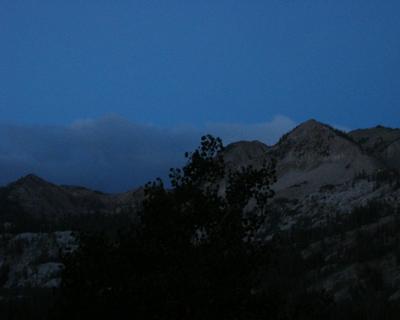
I'll be away from the PC all day, and have very little time now, so I thought I'd post some reading you might enjoy:
Have fun.
Bill Whittle posted his latest essay, Responsibility, yesterday. A vast oversimplification of his argument is that the willingness to take personal responsibility for one’s choices is the key discriminator between one’s positions on many of the issues that define the traditional camps of “conservative” and “liberal.” In Bill’s words:
Political Correctness, Deconstructionism, Trans-National Progressivism, Liability mania, Crime and Punishment, Terrorism, Welfare, Gun Control, Media Bias, Affirmative Action, Abortion, Education Reform, Social Engineering – all of it – will divide people according to their idea of Responsibility.
What many people don’t know is that there is psychological construct that I believe effectively describes—and predicts—the willingness to take personal responsibility. It’s called Locus of Control, and it was first published by Julian Rotter in Psychological Monographs (80, 1, Whole No. 609) in 1966.
In layman’s terms, Locus of Control describes the extent to which people believe the outcomes they get in life result either from their personal actions or from events outside their personal control. Very simply, people with an “external” locus of control believe things happen to them, while people with an “internal” locus of control believe things happen because of them.
I’ve wondered for some time how Locus of Control and political ideology correlate; I’ve found no extent research on the topic through a quick online search, but that doesn’t mean it’s not out there. If the Whittle Principle is correct, the correlation between Locus and Control and political ideology should be relatively high. Maybe I’ll design a quick on-line survey that measures both scales, run the stats, and let you know what I learn.
In the meantime, if you’re curious about your own Locus of Control, there are several self-assessments online which are reliable, short, and consistent with Rotter’s research.
And if I decide to create the online survey relating Locus of Control and political ideology, you’ll see it in this space first.
Back in Brighton on an unanticipated trip to Utah to attend a funeral service. (Note to well-wishers: a very dear friend of the family, but not an immediate family member; I’m fine, sad this person is gone, but glad she’s found relief.) Came in late last night, and with the exception of nearly slamming into Bullwinkle J. Moose on the canyon road (mooses are very comfortable ambling down the middle of the road, it seems), arrived without incident.
It is, as always, beautiful here. This morning I chose a hike to Catherine Pass as my morning physical (as my sweet Swedish grandmother would have said), but today decided to make the hike a bit of a test. When I first made this hike in June, I was shredded for a day; two weeks ago, I made the trip with much greater ease; today, I wanted to see how quickly I could make the hike round-trip.
The results: Up in 56 minutes, down in 27 (I ran down) … 3.8 miles and 1,450 vertical feet round-trip in 1:23, a time I’m quite proud of. Oh, and I snapped this along the way: Mt. Millicent reflecting on Lake Mary.

Finally, a warm moment from last night: While making my way through SLC International I passed a crowd of 25 or so people waiting for someone to exit terminal security. At first I thought it was a crowd of Mormon well-wishers welcoming a missionary home from the field (a very common site in SLC International … “Welcome home, Elder!!”), but looking closer I noticed first flags on shirts, then flags in hands, then a large flag (with the lyrics of “God Bless America” sewn along the stripes of white) held between two folks, and finally, a large banner stating “Welcome Home Dennis” held between two other folks.
This was a different kind of welcome home. This was a welcome home for a soldier.
So I stood and watched for a moment, hoping to witness the singular scene of a mother embracing a son returned from battle. I didn’t wait long, as only a moment passed before I heard a woman shriek “There he is!!” And here came Dennis, moseying off the escalator, jar-head haircut and broad shoulders, around which his mother immediately wrapped herself. And the crowd collapsed upon him.
Country. Family. Maternal love. Duty. Honor. A safe return. It was the highlight of my week.
Welcome home, Dennis. Thank you for rushing into the breach.
The Cotton Bottom Inn is a dark, relatively gritty hovel in the Salt Lake City suburbs that’s been around so long that many patrons’ parents used to drink there. It's small, with only a handful of tables, but there is a jukebox and pool table to serve as entertainment for those who can’t appreciate watching the bikers, skiers/hikers, college students, high school students with fake IDs, construction workers, models, baby boomers, and 70-year-old geezers who come and go at the bar. If the dark, smoky and dive-like interior isn’t for you, sit outside and enjoy the sun or stars (it’s first come, first serve on seating, and there are no reservations).
There are always a few beers on tap: the Bud standards, and two or three local microbrews (the favorite of the regulars is the Wasatch Beers Hefe-Weizen). I’m certain there’s a menu, but I’ve never seen it, and neither have 90% of the locals who eat here. This is because in reality there’s only one thing to order at the Cotton Bottom Inn: The Garlic Burger (yes, that’s a proper noun, as The Garlic Burger is so fantastic as to warrant the grammatical plumage a proper noun brings). It comes with a side of chips, and paired with one (or two, or three) beers, it’s a full meal. It's the best burger I've ever had, and I never come to Salt Lake without eating at least one.
And yes, you are supposed to enter through the kitchen.
Final rating: Four out of four stolen crab forks, unless you hate dives, can’t appreciate a place with character, or need the trappings of sophistication. If so, the food and beer are still four-for-four, but you’d hate the place anyway, so don’t bother going.
An interesting day yesterday, as Wife, her friend, and I made the hike from the Brighton trailhead to Sunset Peak, elevation roughly 10,700 feet. You can see the peak in the snap below (click the pics for larger versions), which was taken from Catherine Pass, which sits at 10,240 feet. (Noted for the record: 70-year-old Father made the trip to Lake Catherine, just below the pass, then tromped out another three miles or so exploring while we went to the summit. We should all be so fit at 60, let alone 70.)
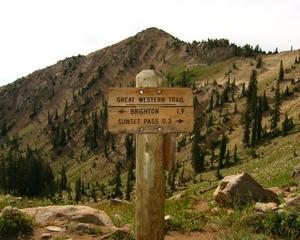
In one way the hike was nondescript, save the grandeur of the wild around us. We made our way from the Brighton parking lot, past Dog Lake and Lake Mary, past Lake Martha and Lake Catherine, and up to the pass. (You can see pics from an earlier hike here.) From the pass we hiked the ridgeline to the summit, where we enjoyed a 360 degree panorama that defies easy description. The clouds broke, sunshine streamed down on the windy summit, and we took in vistas from Idaho to Colorado to the Aquarius Plateau to the Wasatch Range’s Mount Superior. We were very much on top of the world.
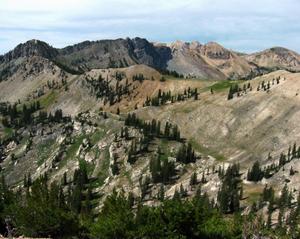
After enjoying the view, a sandwich, and the rush of adrenaline we made our way down the mountain, enjoying vistas and meadows of wildflowers that we’d missed on the way up. We linked up with Father, reached the trailhead without incident, and enjoyed a beer and lunch at the very special Silver Fork Lodge (dining review to follow).
Again, in one way, the hike was nondescript. In another, however, it was quite unique. We had heard on the news that since Saturday a hiker had been missing in Little Cottonwood Canyon’s Grizzly Gulch, which is on the opposite side of the Catherine Pass hike we’d just made … if we’d continued along the trail from the pass rather than headed to the summit, we’d have dropped into Grizzly Gulch and Little Cottonwood.
The hiker’s name was Micah Clark. He had hiked into Grizzly Gulch with photography equipment and a GPS, and it was clear to me that he must have been headed to Catherine Pass, the ridgeline upon which the Great Western Trail lies, and Sunset Peak. It is the photographer’s destination.
Evidence of his absence was immediate. We could see the search aircraft circling, and each hiker on the trail knew the story and talked of being just a bit more aware and observant than usual. And we were being observant when, just off the summit during our descent, Wife and I heard three short blows of a hiker’s emergency whistle. I went off-trail, working my way along the talus, first to the ridgeline, and then back along a short cliff line running East-West maybe 30 feet below the trail. As I did I looked for spots that would attract the photographer’s eye, vistas that would be right with the light of mid- or late-day. Many were along small promontories below the talus, points where a misstep would lead to a direct fall of 10 to 30 feet to a steep and rocky slope.
I called and whistled along the way, working my way along the talus, to the ridge, and back along the cliff line twice. Giving up, I rejoined Wife and her friend at the trail, and they explained that other hikers had told them of a rescue party working in the basin below us, and it would have been their whistle that I heard.
It was a strange thing, going into the Catherine cirque with the airplanes passing above us, knowing that their passengers, the other hikers on the mountain, and we were all tied by some thin thread to a shared and somber activity: We were all looking. Each of us, at some time, remembered or talked of Beck Weathers, or Aron Ralston, or some other individual who survived in the wild. And we all recognized, knowing that days had passed, that we were at least partly resigned to the likely outcome.
Yesterday afternoon we learned that they found Micah’s body about 1:00 P.M., about one mile from his truck at the trailhead, which would put his location at Catherine’s Pass and Sunset Peak. It’s very possible that the whistles I heard were the alert of the party, calling the others to note that they had found his camera and tripod. I suppose I won’t know.
Yesterday, at times, on the ridgeline trail, we were very close to the edge. While the trail itself is not dangerous, a slip could have resulted in easy tragedy. Somewhere along the way, either on the trail or just off it, Micah Clark slipped. He came prepared, walked where we walked, traced the same trails others had traced, and slipped where others did not.
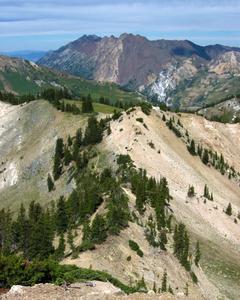 For me there was a message in yesterday’s experience … not one of melodrama, but one of a simple reminder: Each day we walk the ridgeline, the margin between meadow and 800-foot exposure, the margin between fortune and misfortune. It is a fine edge.
For me there was a message in yesterday’s experience … not one of melodrama, but one of a simple reminder: Each day we walk the ridgeline, the margin between meadow and 800-foot exposure, the margin between fortune and misfortune. It is a fine edge.
Artists and authors have cast this message with greater justice than can I, but the message remains, and it was as tangible for me yesterday as it was 12 years ago when I absent-mindedly stepped off the curve and into Salt Lake City traffic, as it was the morning of September 11th, 2001, when I had the good fortune board a commercial flight that arrived safely at its destination. Each day we walk the fine edge. People slip. We should hold those whom we cherish close to our heart.
Wife and I have enjoyed another day in the alpine wilderness just East of Salt Lake City. Today's adventure: After a morning of laying vinyl floor tile (what … that’s not what you do on your vacation?), we made the 3-mile hike to and from Brighton’s Twin Lakes.
The sky is a different color of blue here. It is a brilliant, crystalline blue, bordering on cobalt, the happy product of high altitude and low humidity (as in all my posts, click the pic for a larger image).

It literally throws sunshine at you, this sky, and brings all you see into sharp relief.
Under that sky lie the meadows around Silver Lake, which are rich with summer’s wildflowers, and the lake's wetlands, which offer a wholly unique and striking juxtaposition: the clear, bracing mountain water, lapping at the flowing texture of the cattails and grasses, which give way to the reaching greens of the evergreens and aspens.
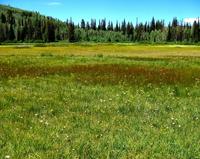

It’s a wonderful, beautiful place, all the more amazing for its proximity, with these vistas slumbering only 20 minutes from the pace and commerce of Salt Lake City. I grew up here and visit often, yet with each return I’m surprised by the beauty … it’s as if the normal nature of memory is turned on its head, with the substance of the thing being more grand in reality than is the memory in reflection.
I’m always surprised, too, that more people aren’t swarming the hills, and with each visit I calibrate my internal barometer of usage: “Are there more people here now than the last trip? Is this busy or slow for a week day? How much trash did we retrieve?”
I know the rapidly growing population of Salt Lake will continue to find this place. It’s simply too near, too easy, and too beautiful, and Salt Lake’s birth rate is simply too high. But I also hope all those seven- and eight-year-olds I see tromping into Target and McDonald’s and down the Silver Lake trail will know a blessing of nature when they see one, and that they’ll offer proper stewardship of its resources. True, a part of me doubts they will, but Salt Lake seems to be doing well so far, and there are plenty of folks around who love the mountains to offer sound counsel.
But in the end, that’s the central issue. It’s a long way from Detroit, this place. I hope the people of Utah will keep it that way. In the meantime, we’ll continue to hike, taking all the sun the sky can throw our way, fingers crossed.
Take the time to visit Eric Caoili's redesign of In The Gray. It's always been an interesting blog, and now it's an even more beautiful site.
Back in Utah for a working vacation. Wife and I awoke this morning for an early physical to Dog Lake. We enjoyed the morning vista (click the pics to see the larger size) …
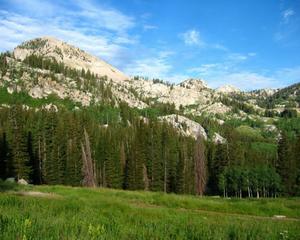
.. and stumbled upon Bullwinkle J. Moose (and his son) along the way.


For an idea of the scale, his ears are about the size of your head. No sign of Rocky.
It's great being back in Brighton, truly. Especially being able to stay here twice within 10 days ... not something I've done in 12 years. Unfortunately, this damned cold is dampening the fun. Who wants to hike at altitude when you're hacking up a lung?
Nonetheless, it's still beautiful ... witness the time-lapse photo I took of the moonrise early (3:30) this morning:
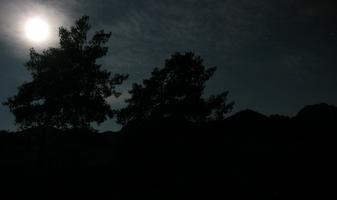
My friend and compatriot Michele is nothing if not prolific. Here's the latest: Retrovertigo. Give it a look.
And yes, you're reading the dispatch line correctly: I'm back in Utah at Brighton, and unfortunately, with a real pain-in-the-ass of a summer cold. But if a moose wanders by, I'll be certain to get a snap.
Scrambling to leave Brighton and fly back to Philly ... not an easy thing to do today, as the sky is brilliant blue and the temperature will be 80 at Noon. Nonetheless, duty calls, and when home I can help Wife celebrate this. For those coming from Michele's place or the Yahoo Weblog Directory, welcome; I might suggest checking out the Caption Contest below.
Blog you from Philly ...
The Broad-Tailed Hummingbird. Location: right off the front porch.
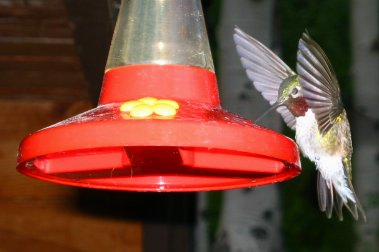
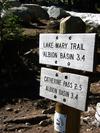 I spent this morning hiking from the base of Brighton Ski Resort up to Sunset Peak and the Great Western Trail. It's a hike of around 5.5 miles round-trip, with an elevation change of around 1,600 feet (from the Brighton parking lot - 8,800 or so feet - to Sunset Peak - 10,400 or so feet). The trail runs through the Wasatch-Cache National Forest the entire way, and while it absolutely kicked my ass physically, it was a rich reminder of why this place is special, and why I’m always compelled to return.
I spent this morning hiking from the base of Brighton Ski Resort up to Sunset Peak and the Great Western Trail. It's a hike of around 5.5 miles round-trip, with an elevation change of around 1,600 feet (from the Brighton parking lot - 8,800 or so feet - to Sunset Peak - 10,400 or so feet). The trail runs through the Wasatch-Cache National Forest the entire way, and while it absolutely kicked my ass physically, it was a rich reminder of why this place is special, and why I’m always compelled to return.
The trail begins in Brighton's parking lot, and for the first mile or so I wound under chairlifts and across ski trails, gaining elevation rapidly as I went. The first milestone on the hike is Lake Mary, a deep, blue, and clear mountain lake where I went fishing with my father as a kid, and where my older brother went marauding with young women as a teenager.
![]() Most hikers stop at Mary, but I continued on, climbing higher, past little, green Lake Martha, and ultimately climbing to a cirque from which I enjoyed a fantastic view of Lake Mary, Brighton, and the opposite side of Big Cottonwood Canyon. It's on the climb to this cirque that I lost the trail in the snow pack ... of course, when in doubt of the trail, my motto is "climb straight up," which I did, and which in retrospect, may not have been particularly bright.
Most hikers stop at Mary, but I continued on, climbing higher, past little, green Lake Martha, and ultimately climbing to a cirque from which I enjoyed a fantastic view of Lake Mary, Brighton, and the opposite side of Big Cottonwood Canyon. It's on the climb to this cirque that I lost the trail in the snow pack ... of course, when in doubt of the trail, my motto is "climb straight up," which I did, and which in retrospect, may not have been particularly bright.
Regardless, it's this cirque, formed by Mt. Tuscarora, Sunset Peak, and Pioneer Peak, that holds Lake Catherine. Climb to the top of the ridge, and you're shortly on the Great Western Trail and up to the panorama of Sunset Peak. At this altitude, the ground is increasingly barren, but even with the large amount of snow pack still on the ground, the early wildflowers were making their appearance.
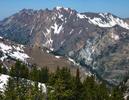 After another 120 feet of vertical I finally reached Catherine Pass. I enjoyed the view for a minute, then trekked along the ridgeline another .3 miles until I intersected the Great Western Trail. An amazing thing, intersecting a trail like the Great Western, a thing of inherent possibility: turn right, and hike mountains and deserts South all the way to Mexico; turn left, and hike ridgelines and plains North all the way to Canada.
After another 120 feet of vertical I finally reached Catherine Pass. I enjoyed the view for a minute, then trekked along the ridgeline another .3 miles until I intersected the Great Western Trail. An amazing thing, intersecting a trail like the Great Western, a thing of inherent possibility: turn right, and hike mountains and deserts South all the way to Mexico; turn left, and hike ridgelines and plains North all the way to Canada.
This time, though, I did neither, instead making a short climb to Sunset Peak and its extraordinary 360-degree panorama. With today's clear blue sky, from here I could see Mt. Timpanogos to the South, the Unita Mountains on the Wyoming border to the Northwest, all of Brighton, and in Albion Basin, the Alta parking lot and the top of the Snowbird Tram (elevation 11,000).
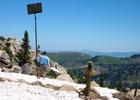 You're at altitude at Catherine Pass, around 10,200 feet ... in the winter, the snow here is 10 to 20 feet deep (as this snap of me next to a ski resort boundary sign illustrates ... in the winter, this sign is supposed to be at eye-level). I was completely alone, unless you count my friend the chipmunk and his somewhat more adventurous cousin, the "pot gut."
You're at altitude at Catherine Pass, around 10,200 feet ... in the winter, the snow here is 10 to 20 feet deep (as this snap of me next to a ski resort boundary sign illustrates ... in the winter, this sign is supposed to be at eye-level). I was completely alone, unless you count my friend the chipmunk and his somewhat more adventurous cousin, the "pot gut."
It was quiet, warm, and beautiful. My legs ached, but it was worth the climb. I sat on a warm rock at the top of the peak, closed my eyes, and listened to the wind, birds, flies, and bees. It took two hours to make the climb, and after 30 minutes on top, I started down. As I retraced my steps (managing to keep the trail this time) I met other knots of climbers, in twos and threes, making their way up.
"How is it?" they'd ask.
"Wonderful," I'd say, knowing all the while that in having had the cirque to myself all morning, I’d also already had the best hike of the lot.
I don’t dream about work. At least, if I do, it’s a rare occurrence. And if I have an anxiety dream, it’s always one of three scenarios:
The “There’s A Shark In The Water That I Can See From The Boat / Dock / Poolside” dream (symbolism: there’s a lurking problem I must solve)That said, I just awoke from a new dream … we’ll call it the “Trying To Work Out Last-Minute Travel Arrangements At The Airport In My Robe And Slippers” dream (symbolism: insanity, near as I can tell).The “There Are Tornadoes On The Horizon From Which I Must Hide” dream (symbolism: chaos … my life is totally out of control and I need to slow down or cut some things out)
And rarely, once every five years or so, the “It’s Final Exam Day At College And I Have To Choose Whether Or Not To Take The Test For The Advanced Mathematics Class I Didn’t Attend All Term” dream (symbolism: who knows)
In the dream, I’m at PHL (which, this being a dream, was laid out like SLC) with Wife. For some reason or another I had the bright idea to arrive early to check in for our flights, her going one place, and me flying to somewhere obscure … where, I can’t recall. Regardless, I wanted to check in so early that I’m at the airport in my slippers and robe.
After being ignored by several agents who call people from the non-frequent-flier line ahead of me, I try to explain to the agent that Wife and I are both checking in, but that we’re going to different places. This confuses the agent to no end, and we endure a long stream of frustrating moments, gazing at the agent typing endlessly into her terminal, only saying things like “Hmm” and “I see.”
Finally, I come to learn that I’m flying into Sioux Falls with a connection in Kansas City … and a connection time of two minutes. Through all of this, I keep searching in my briefcase for my itinerary, which I cannot find … I pull out train schedules, old itineraries, magazines … but no itinerary for this trip. When I finally do find it, I turn around to see that somebody has muscled into my space at the counter. Sure, I confront the interloper and shame him away, but do so with the nagging understanding that I’m the guy in at the airport in his robe and slippers.
When we finally get the reservations worked out … after we’ve been at the airport for what seems like hours … we move for the door so I can go home, pack, shower and change. At that point the agent calls out to say that they’ve been paging me and that my flight is boarding. She adds, hopefully, that there have been some delays, so I just might make it.
So now the “Checking In” frustration dream turns into a “I’m Not Ready And I’m Nearly In My Underwear” dream … at which point my conscious, obviously deciding that enough is enough, claws its way to the surface and I awake.
So, how was your night?
For reasons which should be obvious.
There is a young cowboy he lives on the range
His horse and his cattle are his only companions
He works in the saddle and he sleeps in the canyons
Waiting for Summer, his pastures to changeAnd as the moon rises he sits by his fire
Thinking about women and glasses of beer
And closing his eyes as the doggies retire
He sings out a song which is soft but it's clear
As if maybe someone could hearGoodnight you moonlight ladies
Rockabye sweet baby James
Deep greens and blues are the colors I choose
Won't you let me go down in my dreams
And rockabye sweet baby JamesNow the first of December was covered with snow
And so was the turnpike from Stockbridge to Boston
Lord, the Berkshires seemed dream-like on account of that frosting
With ten miles behind me and ten thousand more to goThere's a song that they sing when they take to the highway
A song that they sing when they take to the sea
A song that they sing of their home in the sky
Maybe you can believe it if it helps you to sleep
But singing works just fine for meGoodnight you moonlight ladies
Rockabye sweet baby James
Deep greens and blues are the colors I choose
Won't you let me go down in my dreams
And rockabye sweet baby James-- SWEET BABY JAMES (James Taylor)
For the next several days I have the extraordinary good fortune to call this my office ...
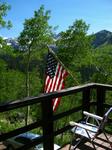 Brighton is a beautiful place ... great skiing in the winter and temperate alpine afternoons in the summer. Up here (around 9,000 feet above sea level) the food tastes better, the beer seems colder, and the sleep is always deeper. And with the wonders of DirecTV, I was even able to root for my horse (who, I'm sad to say, lost).
Brighton is a beautiful place ... great skiing in the winter and temperate alpine afternoons in the summer. Up here (around 9,000 feet above sea level) the food tastes better, the beer seems colder, and the sleep is always deeper. And with the wonders of DirecTV, I was even able to root for my horse (who, I'm sad to say, lost).
Some more pics you can click ... you know, so you can get the mood of the place ...

